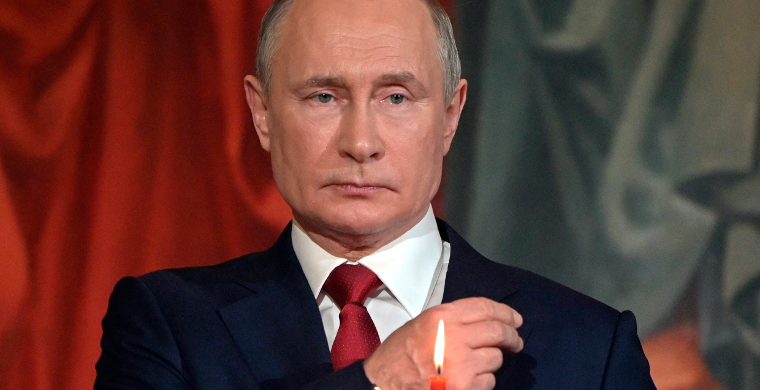Why white evangelical Christians are Putin's biggest American fan base
Evangelicals are a long way from how they historically thought about Russia and communism.
Image: Vladimir Putin crosses himself during the Easter service.
By Anthea Butler,
MSNBC Opinion Columnist
March 1, 2022
While the world looks on in horror as Russia's invasion of Ukraine unfolds, one group has been praising Russian President Vladimir Putin. It turns out Putin has a fan base in America's right-leaning evangelical politicians and pundits.
Putin has a fan base in America's right-leaning evangelical politicians and pundits.
At this year's Conservative Political Action Conference, which wrapped up over the weekend, Lauren Witzke, a GOP candidate for the Senate in Delaware, said: "Here's the deal. Russia is a Christian nationalist nation. They're actually Russian Orthodox. ... I identify more with Putin's Christian values than I do with Joe Biden."
This isn't an uncommon stance among some Republicans and white American evangelicals today, who have previously admired Putin because of the alignment of their beliefs with his about homosexuality, authoritarianism and fealty to former President Donald Trump. Many believe Putin's nationalism, coupled with their Christian belief, is the way America should be.
A few months ago, it's likely that not much attention would have been paid to a statement like Witzke's, nor would her support for Putin be so closely connected to her support for Trump. But in light of Russia's current actions, more pro-Putin American evangelicals are coming into sharp focus. Televangelist Pat Robertson proclaimed that Putin is "being compelled by God" to invade Ukraine -- his take on Putin's motivations is questionable at best, but his support for Putin as part of a divine plan is notable.
As things escalate in Ukraine, evangelicals and Republicans alike are faced with a hard choice: How do they support the authoritarian policies of Putin while Ukraine and its evangelical population face the horrors of war? I suspect it will be difficult for evangelicals and Republican officials to continue to be as effusive as their idol, Trump, has been about Putin. Because if they indeed believe in the so-called family values of the church, the images we're seeing of Ukrainian parents' being separated from their children to escape Russian forces is much harder to justify.
Evangelicals are a long way from how they historically thought about Russia and communism. Back in the 1950s, white evangelical leaders like Billy Graham preached against the evils of communism and called then-Soviet states "godless" and a threat to Christianity and America.
Fast-forward to the 21st century, and today's evangelical leaders, as well as Republicans, have embraced Russia -- and, more specifically, Putin. In 2014, Putin made the cover of the evangelical magazine Decision in a piece in which Graham's son Franklin lauded his handling of the Winter Olympics and his protection of Christians. Franklin visited Russia in 2015, and ever since, has promoted Putin as a godly leader. A few days before the invasion of Ukraine, he asked people to "pray for Putin" but not for Ukrainians, creating a decent amount of backlash.
But whether or not American evangelicals try to distance themselves from Putin in this current news cycle, they have long gravitated toward the Russian president for his hard-line stance against Muslims and, most importantly, his anti-LGBTQ agenda. Putin's rhetoric about the nation, the family and the church (in this instance, the Russian Orthodox Church), has captivated many and spurred them to embrace similar kinds of political action here in America. Consider all of the anti-gay and anti-transgender laws that are cropping up in states like Texas and Florida. These laws are part of a constellation of family-focused conservative religious ideals also embraced by Putin and other Eastern European leaders who have clung to a hard line against any so-called "anti-family" ideology.
For members of the religious right, alliances with these leaders present a new frontier in their hope to achieve a theocracy in America. According to journalist Sarah Posner, those on the religious right see Eastern European countries that embrace the Orthodox Church and its family values as the way forward. Because of these interactions between Eastern Europe authoritarian leadership and religious and political leadership of the GOP in America, clampdowns in the U.S. on abortion rights, trans children's rights and gay rights are therefore all coming back full force on the state level. We can't of course forget that Trump's consistent and solid support of Putin is also a significant factor.
Meanwhile, other faith leaders in America held a vigil for peace in Ukraine, and Pope Francis visited the Russian Embassy in Rome, a sign of the seriousness of the situation. As the conflict in Ukraine continues, admiration of Putin by some white evangelicals and Republicans may lead to more than they bargained for.
END














